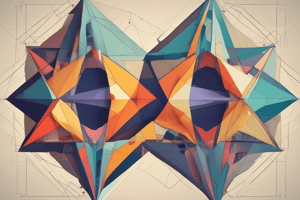Podcast
Questions and Answers
How do you construct a triangle using rulers and compasses?
How do you construct a triangle using rulers and compasses?
Select one angle as a reference point, draw lines through each vertex, and connect endpoints of two sides to form two legs.
What tools are commonly used in practical geometry for constructing geometric shapes?
What tools are commonly used in practical geometry for constructing geometric shapes?
Rulers, compasses, and protractors.
What is the first step in constructing a circle?
What is the first step in constructing a circle?
Make a small dot where the center of the circle will be located.
How are circles created using a pencil and a circular path?
How are circles created using a pencil and a circular path?
What are the defining characteristics of a rectangle?
What are the defining characteristics of a rectangle?
What type of triangle is created when following the steps to construct a triangle?
What type of triangle is created when following the steps to construct a triangle?
How are the legs of a triangle positioned relative to the third side during construction?
How are the legs of a triangle positioned relative to the third side during construction?
What is the purpose of selecting one angle as a reference point in triangle construction?
What is the purpose of selecting one angle as a reference point in triangle construction?
How can a circle be formed by moving the pencil around the circular path?
How can a circle be formed by moving the pencil around the circular path?
What geometric property is emphasized in the construction of rectangles?
What geometric property is emphasized in the construction of rectangles?
Study Notes
Geometry is a field of mathematics concerned with understanding size, shape, direction, and location. In practical geometry, we focus on constructing various objects using tools like rulers, compasses, and protractors while maintaining accuracy. Here's how you can construct some basic geometric shapes:
Constructing Triangles
To draw any triangle, follow these steps:
- Select one angle from which all three sides will radiate outwards. This point will become your reference point.
- Draw lines extending from this point through each vertex of the triangle, creating an equilateral triangle.
- Connect the endpoints of two sides to form two legs perpendicular to the third side of the triangle. These two legs create an acute angle between them.
Constructing Circles
Circles are constructed by following these steps:
- Make a small dot where you want the center of the circle to be located. That'll be the center of rotation.
- Using your pencil, move it around the circular path you just created until it touches one edge of your drawing paper. Then, pull away from that line until there's enough space so that when you complete another revolution, the tip always remains in contact with its neighboring segment. This gives you an infinite number of equally spaced points along the circumference, forming what we call a circle!
Constructing Rectangle
Rectangles are composed of four right angles and horizontal and vertical lines. To make these shapes, simply connect the corners of squares together in pairs on opposite sides. If you're making a rectangle with 90-degree angles, you could also just straighten out those corners. A rectangle can have any length and width; if the ratio of its width to height is less than 1, it's called a square.
By mastering these techniques for constructing shapes, you can effectively build more complex figures such as polygons and other geometrical structures.
Studying That Suits You
Use AI to generate personalized quizzes and flashcards to suit your learning preferences.
Description
Learn how to construct basic geometric shapes like triangles, circles, and rectangles using rulers, compasses, and protractors with precision and accuracy. Mastering these techniques can help in creating more complex figures and geometrical structures.




